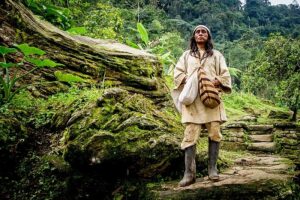Matyas Baan, safeguarding advisor at Save the Children and 2020 MAODE graduate explains how the critical reflection skills he gained from his Masters study have influenced him in connecting education with the future of our planet.

Matyas writes:
My name is Matyas Baan, I work as a safeguarding advisor at Save the Children, and I run my own company offering social and environmental safeguarding consulting services. I completed the Master of Arts in Online and Distance Education, the predecessor of the MAOT, in 2020. Besides all the subject-specific knowledge I gained, I credit this programme with introducing me to critical reflection and research.
I believe we must rise to the challenge of taking responsibility for shaping our educational future. When I think about technology, I try think of what good it can do for humanity and the Planet, rather than get caught up in a feeling of awe. There is a huge cost to technology, its production has had a devastating environmental impact, so we had better use it wisely. It has recently been estimated that by 2027 the Earth will likely have warmed by 1.5 degrees Celsius. At the same time, we keep flooding our environment with unprecedented levels of chemical pollution. At the same time, we are in the middle of man-made mass extinction event and the loss of biodiversity and natural habitats increases our chances of more, potentially deadlier pandemics. At the same, time our mental health is on the decline. Etc.
What can educational technology and educators do? Firstly, technology enhanced learning can reach people all over the World and content can be created by anyone, from anywhere. Consequently, it is an incredible tool with many possibilities that can help us shape our future. I would like to mention an often overlooked such possibility: decolonising education. Although some of us may believe that we Westerners are the best caretakers of the Earth, the current state of affairs suggests otherwise. There are indigenous civilisations out there that may have more expertise – expertise not only expressed in technological advances – than we do. One such group is the Kogui tribe in the Sierra Nevada de Santa Marta mountains of Colombia. Their environmental expertise has been recognised by the United Nations and they claim to be willing to share it. It is up to us educators savvy in Educational Technology to help the voice of these experts be heard.

Interested in finding out more about The Open University’s Masters in online teaching?
In 2023 we launched the OU’s new Masters in Online Teaching, an innovative postgraduate programme exploring the ways that new media, digital pedagogies and cutting-edge educational technologies can be used effectively and equitably, across multiple sectors, to engage diverse learners and meet their needs. The programme offers flexible study pathways featuring a choice of topics, study intensity and study timing, and the option to include credit from a select postgraduate microcredentials. One of the micro-credentials we will offer from autumn 2023 will be Teacher Development: Addressing the Climate Emergency which focuses squarely on the urgent need for climate emergency-related education and awareness of climate justice and ways to teach climate science and ways of embedding relevant topics in the curricula of other subjects. Keep an eye on the link below for details as they emerge over the coming months.